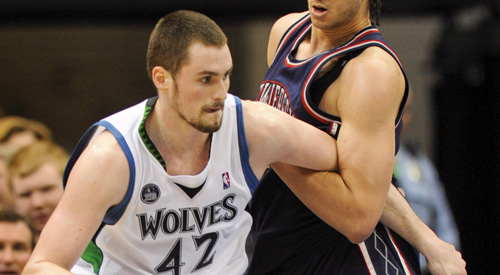
Kevin Love for MVP… Or not
It’s cool to read arguments that Kevin Love is the NBA’s MVP this year. It’s cool in the same ways that reading early REM lyrics or listening to Coast to Coast AM’s Wild Card Line are cool: they don’t really try to make sense, let alone actually make any.
By almost any standard basketball metric, LeBron James is the best player in the NBA right now. He has the highest Player Efficiency Rating at 30.7 and 12.2 Win Shares; best in the league. On his own team, he’s putting up better numbers than the other 60 percent of the big three, especially in shooting stats like True Shooting or Effective Field Goal percentages.
In other words, James is putting up better numbers than anyone in the league, is the best player on his team, itself one of the NBA’s best. This guy should be a shoo-in for MVP, right?
So why is Kevin Love getting to much attention right now?
Only a few days ago, Sports Illustrated’s Zach Lowe wrote a piece titled “Is Kevin Love worthy of MVP honors?” He argued because MVP debates are so hard to pin down to a final answer – awarded to the leagues best player or one that means most to their team – Love is a worthy answer.
“Love passes just about any statistical test you can devise for MVP candidacy,” wrote Lowe. And truth be told, Love does have some good numbers: he’s all over rebounds, second-most in the NBA. He’s among the league’s leaders in PER, points per game and Win Shares.
[php snippet=1]
And he’s doing it on a bad team – the Timberwolves. Again, Lowe shows a telling stat: the difference between Love on the floor and off for the Wolves is a huge, 10-point gap per 100 possessions, or about the difference between Oklahoma City’s offense and Toronto’s.
But therein lays the problem: can you say small sample size? According to 82games.com, Love has spent three quarters of the Wolves’ total minutes on the floor. He’s played the fourth-most minutes in the NBA, has started 52 games and he plays on a bad team. With Ricky Rubio out for the season, Love is by a wide margin the best player on the team.
What about his rebounding, you shriek? Well, what about it? Yes, Love has some of the best rebounding numbers in the NBA. But remember, he’s on a bad team. There’s rebounds every game and Love’s where they go, by virtue of his minutes and poor rebounding from the rest of the team: only Wolves center Nikola Pekovic rebounds close to Love’s rate.
As a defender, Love leaves a lot to be desired, too. His 2.4 defensive win shares and 104 defensive rating aren’t cracking the NBA’s top 20. When he plays as a power forward, Love’s opposition scores about 21 points per 48. When he’s off the court, the Wolves do score less, but they allow less too. In other words, their defense improves.
One can define the MVP any way they want, but surely their definition wouldn’t include phrases like “is a good rebounder on a team of bad ones” or “is a defensive liability, especially in close games.”
On the other hand, LeBron’s among the league’s best defenders: three straight All-NBA Defensive nods, a fourth-in-the-NBA 3.7 defensive Win Shares and a top-10 defensive rating.
It’s cool to see Love’s name among the MVP candidates. And it’s a good story, I’ll admit: he’s taking a poor team into the realm of respectability and maybe even into the playoffs in a couple years.
But that’s the operative phrase: in a couple years. If we’re talking 2012, there’s much better candidates, from Kevin Durant to Chris Paul to, yes, LeBron James. And James is playing head and shoulders above those two. Case in point: the Heat’s win over Oklahoma City on the fourth.
With the Thunder down by three and the clock winding down, Durant ran up court and jacked up a long three: a low-percentage shot in the best of times, and with 16 seconds left to shoot and coming from a full-tilt sprint, it was a bad, bad shot. It was the kind of shot showing how Durant is still putting it together.
That’s not a bad thing: this is only his fifth season and hasn’t turned 24. We’re getting the chance to see him come into his own but he’s not there yet. Let him battle with Love as a possible MVP winner in the future. But look at the 2012 season when awarding its MVP.
The sports media world – myself included – loves a storyline. It lends narrative to an event, helps give it more of an epic feel. One can see the media trying hard to find a storyline for this year’s MVP award: from Simmons somehow deciding Kobe Bryant needs to be in this race to writers racing to outthink themselves in deciding how Durant and Love are somehow better players than James. No matter how you define it, the MVP race couldn’t be simpler: it’s James.
[php snippet=1]

